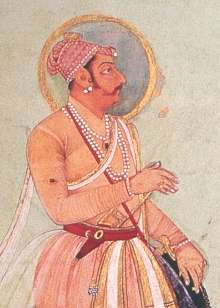Jaswant Singh of Marwar
| Maharaja Jaswant Singh | |
|---|---|
| Ruler of Marwar | |
 Jaswant Singh of Marwar | |
| Ruler of Marwar | |
| Reign | 6 May 1638 – 28 November 1678 |
| Coronation | 25 May 1638 |
| Predecessor | Maharaja Gaj Singh |
| Successor | Maharaja Ajit Singh |
| Born |
26 December 1629 Jodhpur |
| Died |
28 December 1678 (aged 49) Jamrud, near Peshawar |
| Spouse | Mahamaya and Others |
| Issue Detail |
Prithviraj Singh Ajit Singh Others |
| House | Rathore |
| Father | Maharaja Gaj Singh |
| Mother | Maharani Pratap Devi |
| Religion | Hinduism |
Maharaja Jaswant Singh (26 December 1629 – 28 December 1678) was a ruler of Marwar in the present-day Indian state of Rajasthan. He was a Rajput belonging to the Rathore clan. His father was Maharaja Gaj Singh. He was a distinguished man of letters and author of "Siddhant-bodh", "Anand Vilas" and "Bhasa-bhusan" He was The Subehdar of Assam from 1656-1666 9 years long.
History
Jaswant Singh succeeded his father on his death by special decree of the Emperor Shah Jahan, in accordance with his father's wishes, on 6 May 1638. He was invested by Imperial authority and granted the parganas of Jodhpur, Sivano, Merta, Sojat, Phalodi and Pokaran (Satalmer) in jagir.
He was installed on the gaddi at Sringar Chowki, Mehrangarh, Jodhpur, on 25 May 1638. He was granted the personal title of Maharaja by the Emperor Shah Jahan, on 6 January 1654.
Battle of Dharmatpur
In the Battle of Dharmatpur, Jaswant Singh opposed Aurangzeb. The battle was fought on 15 April 1658, fifteen miles from Ujjain. Jaswant could have attacked Aurangzeb but he allowed Murad's armies to join Aurangzeb. He was desirous of beating both Mughal princes at once. This delay allowed Aurangzeb to win over the Mughal General, Kasim Khan, who was sent by Shah Jahan to help Jaswant. Kasim Khan defected as soon as the war started but 30,000 Rathores of Jaswant decided that they would not leave the field. Some prominent generals in Maharaja's army were Mukund Singh Hara of Kotah and Bundi, Dayal Das Jhala, Arjun Gaur of Rajgarh in Ajmer province. Jaswant Singh was able to win the support of the local Rajput chieftains of Malwa such as Ratan Singh Rathore of Ratlam. Jaswant attacked both Aurangzeb and Murad and they barely escaped.
"Ten thousand Muslims fell in the onset, which cost seventeen hundred Rathor, besides Guhilotes, Haras, Gaurs, and some of every clan of Rajwarra (They are all names of Rajput clans). Aurangzeb and Murad (Mughul Kings) only escaped because their days were not yet numbered. Notwithstanding the immense superiority of the imperial princes, aided by numerous artillery pieces served by Frenchmen, night alone put a stop to the contest of science, numbers, and artillery, against Rajput courage."[1]
Finally the unequal contest ended and Aurangzeb named the place of victory Fatehabad. In this battle Durga Das Rathore changed four horses and lost about half a dozen swords (they broke due to intense fighting) and he finally fell down half dead. Maharaja ordered him to be carried away. After his wounds healed he promptly rejoined Maharaja's army.
"Rajputs, even in the moment of battle, worshipped the rising sun, and they sealed there faith in there blood; and none more liberally than the brave Haras of Kotah and Bundi. . . The annals of no nation on earth can furnish such an example, as an entire family, six royal brothers of Kotah, stretched on the field, and all but one in death. Of all the deeds of heroism performed on this day, those of Ratan Singh Rathore of Ratlam, by universal consent, are pre-eminent, and are wreathed into immortal rhyme by the bard in the Raso Rao Ratan."[2]
Treatment of Prithviraj Singh by Aurangzeb
Prithviraj Singh was Jaswant Singh's son. It is chronicled in Marwar khyats that Aurangzeb presented Prithviraj Singh a dress which was poisoned. On wearing this dress Prithviraj died in great pain at Delhi, 8 May 1667. Prithviraj was a good leader and a brave prince. Jaswant could not get over the shock of his son's death. He was very saddened because he had no male heir who could seek revenge.
Jaswant died at Jamrud, near Peshawar, on 28 December 1678. At the time of his death two of his wives were pregnant, and both would later bear sons. This led to a war in which there were attempts to install Jaswant Singh's elder surviving son Ajit Singh Rathor as ruler of Marwar.[3]
See also
References
| Wikimedia Commons has media related to Jaswant Singh of Marwar. |
- ↑ https://archive.org/stream/annalsantiquitie01todj/annalsantiquitie01todj_djvu.txt
- ↑ Annals and Antiquities of Rajast'han By James Todd
- ↑ John F. Richards. The New Cambridge History of India: The Mughal Empire (New York: Cambridge University Press, 1993) p. 180-181
- Rathor, Durgadas (1999). Raghubir Sinh. Publisher: Panchsheel Prakashan Jaipur 302001. ISBN 81-7056-051-9 (Life history of DurgaDas Rathore and his help in getting Ajit Singh out of Delhi and then leading the Rajput rebellion against Aurangzeb while Ajit was still an infant)
- Rathaurha, Vira Durgadasa (2005). Ved Prakash Publisher: Rajbhasha Pustak Pratishthan, Shivaji Marg, Delhi 110053. First published 2005. ISBN 81-88613-10-X
- Rathaura, Svatamtrata-premi Durgadasa (2000). Sukhvir Singh Gehlote Navbharat Publications, Jodhpur 342 001, Rajasthan. (Details of Durga Das Rathore's life)
| Preceded by Gaj Singh |
Maharaja of the Marwar 1638–1678 |
Succeeded by Ajit Singh |